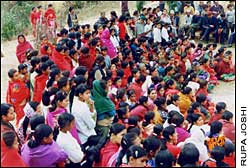 Formulating five-year-plans has become something of a tradition in Nepal. And the recently announced 10th Periodical Plan approved by the National Planning Commission, follows in that grand tradition by harping on poverty alleviation just like previous plans. This time around, however, the new twist is a stronger focus on "women's empowerment and gender mainstreaming".
Formulating five-year-plans has become something of a tradition in Nepal. And the recently announced 10th Periodical Plan approved by the National Planning Commission, follows in that grand tradition by harping on poverty alleviation just like previous plans. This time around, however, the new twist is a stronger focus on "women's empowerment and gender mainstreaming". Although women are considered central to this plan, the programs to fulfill this objective do not live up to the promise. Bringing women into the mainstream should perhaps begin with policy makers. The patriarchal bias of the plan's male economists and planners is rather obvious. It is impossible to ask for gender mainstreaming if the sub-text is patronising. From the grassroots to the highest level of government, economic decisions are still out of women's reach. In a largely rural subsistence economy women contribute monetarily but are not allowed a decision-making voice.
Let's start with reproductive health. The fertility rate of women is predicted to decrease from 4.1 percent to 3.5 percent thanks to female-targetted family planning. These campaigns are bound to be ineffective because the decision-makers forgot that most decisions inside the home, even that of bearing children, are still made by male family members. Until she can make those decisions both inside the home as well as outside, fertility rates will not change much.
The logical first step would be to encourage literacy among women. Only 37.4 percent of women are literate. Like previous plans the new one aims to raise female literacy to 65 percent. Educated girls become educated citizens, capable of shouldering responsibility and making decisions. Progress in this area has been snail paced and has not been helped by the Maoist insurgency.
Since the last decade, women have been involved in group work, savings, credit and agricultural activities. These could be ideal entry points to address many gender issues. Credit programs would need to widen their focus to incorporate health, education and awareness building. Vocational training sessions that equip women with skills to merge in with the working population should be set up. A credit program that exists in isolation will not work. Unfortunately, there is too little focus on these areas. Instead of building on and learning from past successes, policy makers have flitted impatiently to new programs, increasing suspicions of political machinations.
The 10th Plan also admitted that the economic policies of liberalisation only widened the gap between the haves and have-nots. Financial institutions set under the banner of liberalisation failed in its responsibility towards the disadvantaged. The only assistance available to them are high interest loans that straps them into a financial straightjacket. According to recent international statistics, nearly half of Nepalis live below the poverty line. The commission however, puts the figure at 38 percent and plans to shave off 8 percent in the next five years.
Besides the old vultures of illiteracy, poverty and unemployment, new ones like war and violence have come to prey on our country. The 10th Plan turns a blind eye to the links between violence and Nepal's socio-economic problems. There are no strategies, no plans-nothing in the new plan to indicate the framers were aware of the new crises. One would be hard pressed to guess the nation is undergoing drastic changes at all, so similar is it to the umpteen plans before it.
The 10th Plan recognised poor health and education as two main contributors to poverty. It was decided that poverty can be solved by focusing on economic growth, distribution of resources, human resource development, social balance, empowerment and governance. The five percent growth we experienced in the first years after 1990 now seems like a dream. Yet, the plan tells us to expect economic growth of 6.2 percent this year-if all goes well, fingers crossed.
The bulk of our budget-60 percent-still depends on foreign aid. The instability within the country means increasing the budget for security, which means in turn the marginalisation of developmental activities, the very factor that could turn things around in villages and rural communities.
(Prativa Subedi is a human rights activist, social worker and writer.)


